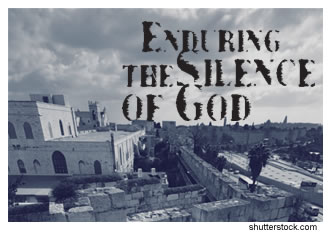by Dr. Paul R. Raabe

“How long, O Lord? How can you be silent, O Lord, when the church’s efforts to spread Your life-giving Gospel in many lands are hindered by hostile governments? How can you be silent when faithful Christians are mocked, persecuted, and even imprisoned just for being Christian? How can You be silent when the holy Christian faith is trashed, twisted and trivialized? How long, O Lord, how long?”
That is the cry the Lord hears from beleaguered Christians struggling through what the apostle Paul calls “this present evil age” (Gal. 1:4).
That was the same cry the Lord heard centuries ago from the prophet Habakkuk. Habakkuk lived in Jerusalem about 600 B.C. He was zealous for the Lord’s name and for the Lord’s people. He earnestly desired to see righteousness prevail. But instead he saw within Judah only violence and iniquity, the wicked prospering and the righteous coming to ruin. So he cried out:
O LORD, how long shall I cry for help,
and You will not hear?
Or cry to You “Violence!”
and You will not save?
Why do You make me see iniquity,
and why do You idly look at wrong?
(1:2–3)
To Habakkuk’s cry the Lord responded (1:5–11). He announced that He was raising up the Babylonians, a cruel and unstoppable army that laughs at every fortress, that easily conquers a city and then sweeps by like the wind. They are “guilty men, whose own might is their god!” (1:11).
To this message Habakkuk replied, “That is even worse!” Like jumping from the frying pan into the fire! The prophet admits that the Lord appointed the Babylonians for the chastisement of the lawless in Jerusalem (1:12).
But the Babylonians? The ruthless Babylonian army will not simply slap Jerusalem’s wrist! With his army the Babylonian king gathers all nations like fish into his dragnet. Instead of ruling over the fish (Gen. 1:26–28), mankind ends up being treated like fish. So Habakkuk protests to God. How can “You make mankind like the fish of the sea” (1:14) before the Babylonian nets? Is the Babylonian king “to keep on emptying his net and mercilessly killing nations forever?” (1:17).
Habakkuk was experiencing the silence of God. Instead of keeping it to himself he brought it to God in prayer:
You who are of purer eyes
than to see evil
and cannot look at wrong,
why do You idly look at traitors
and are silent when the wicked
swallows up
the man more righteous
than he? (1:13)
How can the Lord be silent in the face of such cruelty and persecution? For the Lord is “not a God who delights in wickedness; evil may not dwell with You” (Ps. 5:4).
PRAYERS FROM FAITH
How do we endure the silence of God in times of suffering and persecution? The question is a very real and practical one for the Church and for each one of us as a Christian. Habakkuk can help us bring to God our holy unease in this present evil age. In fact, his protests to God resemble many other similar expressions found in the Psalms, Job, and Jeremiah. Such prayers presuppose that we like Habakkuk are zealous for the Lord’s name and for His Church, eager to see His pure Word spread and righteousness prevail. These are godly prayers that flow from faith. Such prayers proceed even from the souls of the martyrs under the altar as they cry out, “How long, O Lord?” (Rev. 6:10).
The Lord responded to Habakkuk’s protests. He told His prophet to write the vision on tablets—just like the Ten Commandments—and ensure the spread of the message.
For still the vision awaits its
appointed time;
it hastens to the end—it will
not lie.
If it seems slow, wait for it;
it will surely come; it will
not delay.
Behold, his [the Babylonian king’s]
soul is puffed up; it is not
upright within him,
but the righteous shall live by
his faith. (2:3–4)
God’s “vision” was the prophetic revelation He gave to Habakkuk, the hope-filled announcement of the future day of God’s victory. Yes, Habakkuk and the faithful remnant will have to endure the coming Babylonian oppression. But beyond that dark night there will break a new and glorious dawn. Babylonian tyranny will not have the last word. The Lord and His saving kingdom will surely come. If the vision’s fulfillment seems slow, “Wait for it; it will surely come; it will not delay.”
When the day of God’s salvation comes, then the faithful will take up a victorious taunt over their anti-God oppressors (2:6–20). The Babylonian regime will experience God’s righteous judgment. All of their efforts of self-deification and self-glory will prove false. The earth will not be filled with their glory but with “the knowledge of the glory of the LORD as the waters cover the sea” (2:14). The gods of the nations are impotent idols. “But the Lord is in His holy temple; let all the earth keep silence before Him” (2:20). The Lord will once again march forth as a mighty warrior for the salvation of His people (3:12–13).
 How was Habakkuk to endure the silence of God under Babylonian oppression? By hearing and trusting God’s promises. “The righteous shall live by his faith.” The one who is righteous before God by faith will receive the gift of life by faith. Life with God is the ultimate future, not Babylonian death. So wait for the day of victory by steadfastly trusting in the Lord’s promise. That promise enabled Habakkuk to confidently sing at the end of the book:
How was Habakkuk to endure the silence of God under Babylonian oppression? By hearing and trusting God’s promises. “The righteous shall live by his faith.” The one who is righteous before God by faith will receive the gift of life by faith. Life with God is the ultimate future, not Babylonian death. So wait for the day of victory by steadfastly trusting in the Lord’s promise. That promise enabled Habakkuk to confidently sing at the end of the book:
Though the fig tree should not
blossom,
nor fruit be on the vines,
the produce of the olive fail
and the fields yield no food,
the flock be cut off from the fold
and there be no herd in the stalls,
yet I will rejoice in the LORD;
I will take joy in the God of my
salvation. (3:17–18)
A PROMISE FOR GOD’S PEOPLE
The Lord responded to Habakkuk with His promise. And in that B.C. promise lay a promise also for us as God’s A.D. people. It is the promise that heralds the ultimate day of triumph when God’s kingdom comes in power and glory.
John’s Revelation strikes a similar note. Inspired by the Dragon, the two beasts of Revelation 13—persecuting government and its ally of false and tyrannizing religion—will continue to oppress the Lord’s Church. The Lord’s Church will remain a suffering Church under the cross. But there is a day when the Lord Jesus Christ will come again in glory. Then it will be shouted, “Fallen, fallen is Babylon the great!” (18:2). Then it will be said, “The kingdom of the world has become the kingdom of our Lord and of His Christ and He shall reign forever and ever” (11:15). Then we will exultantly sing:
“Hallelujah!
For the Lord our God
the Almighty reigns.
Let us rejoice and exult and
give Him the glory,
for the marriage of the Lamb
has come,
and His Bride has made
herself ready;
it was granted her to clothe
herself with fine linen,
bright and pure”—
for the fine linen is the righteous
deeds of the saints. (Rev. 19:6–8)
We have the prophetic Word made even surer. In the fullness of time the Lord Himself came down from heaven to become the Suffering Servant for us. Even though He led a holy and righteous life, He was despised and rejected. He experienced the silence of God in the worst way as He cried out on the cross, “My God, My God, why have You forsaken Me?” Yet He endured all that for us sinners, in our place and to our benefit. And on the third day He broke through the prison gates of death by His bodily resurrection.
With His life, death, and resurrection, the Messiah has already inaugurated the promised kingdom of God, although in a hidden way. Because of His all-sufficient work we sinners are already reckoned righteous before God through faith. The knowledge of the glory of God in the face of Jesus Christ is already revealed. Habakkuk’s vision has been fulfilled in Christ, and we enjoy its benefits already now as the Lord comes to us through the Gospel and Sacraments. But we have this by faith, not yet by sight. We still await the future consummation of Habakkuk’s vision.
IN-BETWEEN TIME
Therefore we Christians live in the overlap time between Christ’s First Advent and His Second Advent, between the fulfillment of the prophetic Word and its consummation. During this in-between time, we repeat Habakkuk’s words at the beginning and the end of his book. As we struggle along with the Church Militant, we too pray in anguish with Habakkuk, “How long, O Lord?” But with the promise of the Church Triumphant ringing in our ears we too can sing with Habakkuk, “Nevertheless—the great nevertheless of faith—I will rejoice in the God of my salvation” (3:18). This Advent season the prophet Habakkuk can teach us both modes of expression.
A verse from the hymn “For All the Saints” captures the message of this little prophetic book for us as we await the consummation (Lutheran Worship 191; Lutheran Service Book 677):
And when the fight is fierce, the warfare long,
Steals on the ear the distant triumph song,
And hearts are brave again, and arms are strong.
Alleluia! Alleluia!





